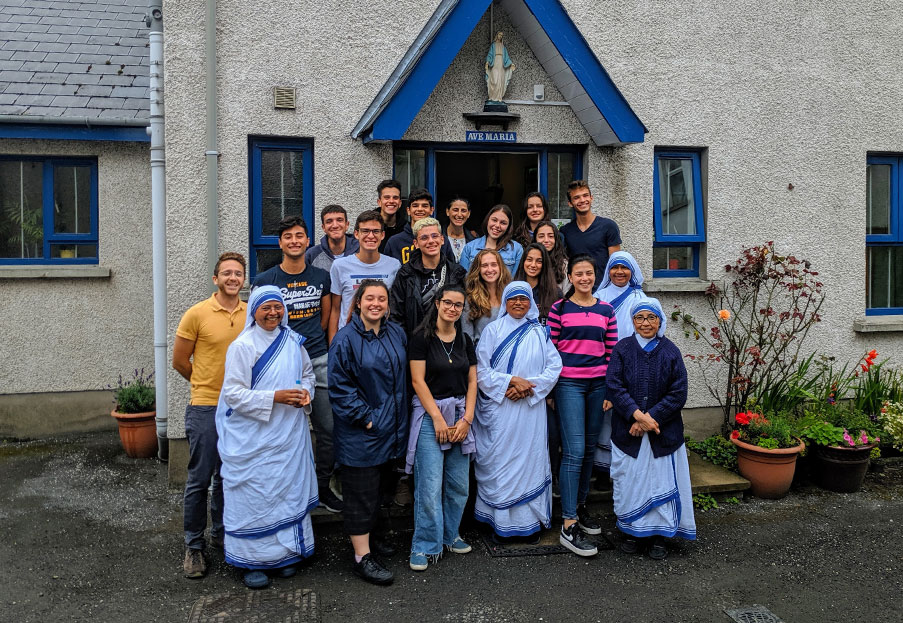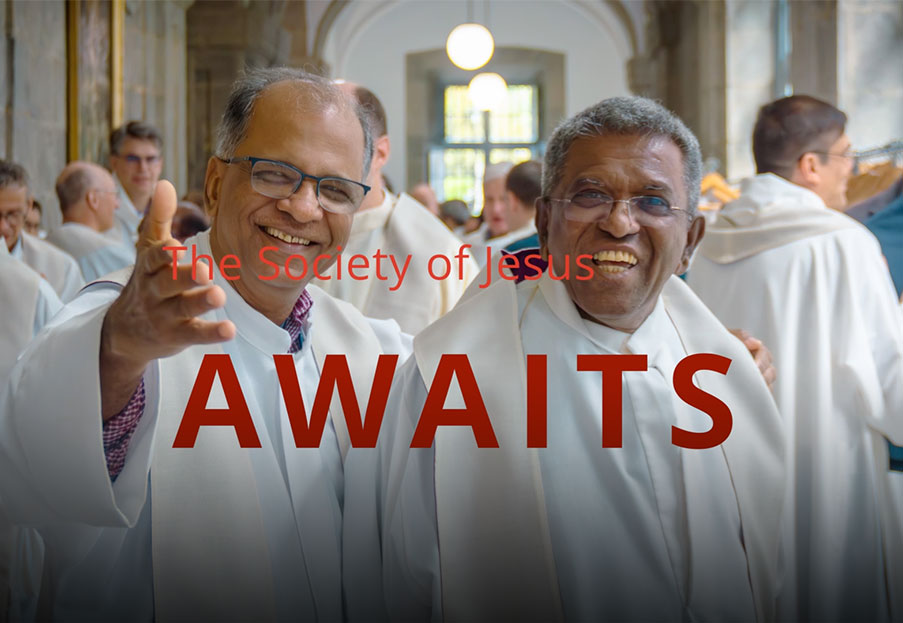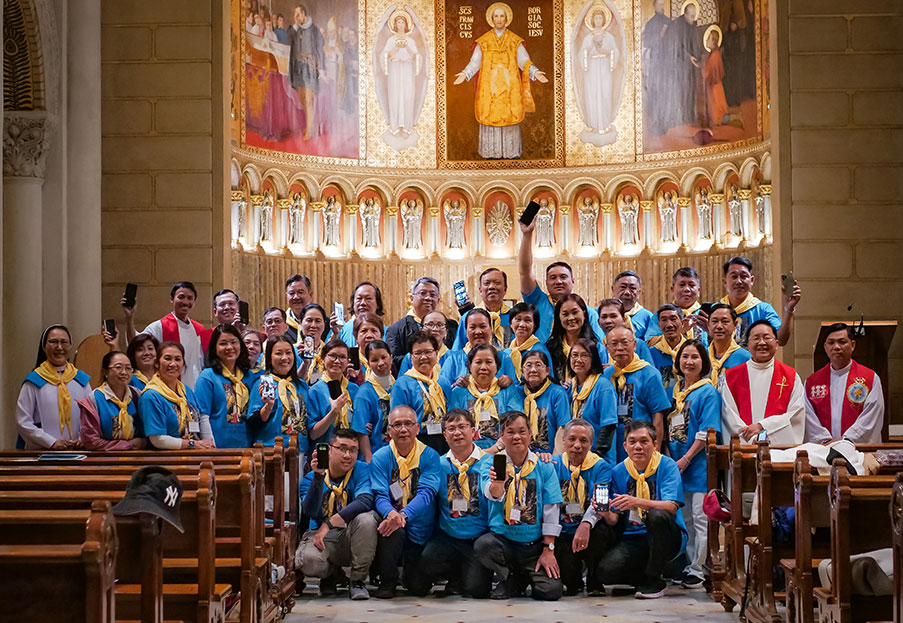Address of Fr. Arturo Sosa SJ to Alumni Bandra, 3rd March, 2019
It gives me great joy to be with you to share our ideas and reflections together. Your presence here this evening is a sign of your attachment to the Jesuit institutions you studied in. It is also a sign of your ongoing commitment to the values and ideals you imbibed during your years in school and college. I appreciate the time and trouble you have taken to be here setting aside your many pressing commitments to work and family.
My address to you today can be broadly divided into three parts. The first will outline the mission of the Society of Jesus in today’s context. The second part will touch on how the Alumni and Jesuits can be partners in taking forward this mission. Finally, I will offer some observations on the role of Alumni Associations.
A. The Mission of the Society of Jesus today
Before talking about the mission proper, it is necessary to first situate the context. In other words, we need to first look at the situation our world is in today. Without elaborating, I briefly mention the chief issues confronting us today.
- Poverty and inequality: Technological advancements have resulted in an explosion of material goods and a wide variety of services. These however remain far beyond the reach of the poor, millions of whom wage a daily battle for survival.
- Large scale displacement of people: Poverty, violent conflicts and natural disasters are causing a large number of people to flee their homes and build up a new life elsewhere. These migrants and refugees have to face huge challenges along the way. We cannot remain indifferent to their plight.
- The Ecological Crisis: Our wasteful use of material resources has caused a rapid degradation of the natural environment. The poor and marginalized are the most affected by this crisis. We are called upon to heed the cry of the earth and the cry of the poor, doing all we can to care for our common home.
- The Rise of the Right Wing and Fundamentalism: Religious identity and national identity are becoming tools in the hands of extremists. These fundamentalist groups are whipping up a sense of fear and insecurity. The result is that minority groups often become victims of violence and policies of exclusion.
- Virtual reality: Information technology has completely changed the world and governs our lives today. It has undoubtedly bestowed on us many benefits. A concern however is that this new way of life has affected our ways of relating. It is paradoxical that new means of communication have reduced our capacity for face-to-face interactions.
The list above is not exhaustive but it highlights the major issues that shape our reality today. It is within this context that the Society of Jesus discerns its mission and the means for carrying this forward.
In humility and sincerity, the Society of Jesus sees its own mission as part of the larger Mission of God. This mission beckons all men and women to be partners with God in creating a world of justice, love and peace. This mission remains essentially the same, but can be approached from different angles depending on the concrete circumstances. In the light of today’s reality, the Society of Jesus has discerned that God is calling us to a Mission of Reconciliation and Justice. We have further identified three dimensions of this mission: Reconciliation with God, with humanity and with Creation. All three are interconnected and inseparable.
Our faith and our experience tell us that God is the source of our life. It is in union with the Almighty that we taste the fullness of life and understand better our purpose on earth. Today, more than ever, humans need to unlock the liberating potential that lies at the heart of spirituality and religious traditions. Jesuits and Jesuit institutions offer Ignatian Spirituality as a powerful way of helping each person arrive as his/her own personal encounter with God.
The immense suffering and injustice in our world is a scandal that goes against the Divine plan and offends the very concept of human dignity. Our Jesuit institutions are committed to forming ‘men and women for others’ – a phrase so dear to the heart of Fr. Pedro Arrupe. We endeavor to build up structures that will support marginalized communities and help them rise to a reasonable standard of life. At the same time, we seek to form the conscience of individuals and promote a culture of fraternity and acceptance.
Reconciliation with creation has taken on a new urgency in recent times. This requires a multifaceted approach that challenges the dominant models of development and promotes a greater respect for God’s creation. At the macro level, we join hands with other experts to identify the roots and solutions to the ecological crisis. We also recognize the challenge to examine our own consumption patterns and adopt lifestyles that reflect our commitment.
B. Alumni engagement in Mission
The Jesuits form one group among many others who are committed to carrying forward God’s mission. We are happy to see that our alumni are also part of this commitment. I shall briefly touch on ways in which alumni contribute to our common mission.
- Involvement in Jesuit institutions: This is one way in which many of you give concrete expression to your commitment. Several among you have worked to upgrade the facilities in your Alma Mater while others have contributed through offering much needed professional services. I am told some of you reach out to assist in other Jesuit works in the rural areas. For instance, the Loyola Alumni Association, Goa has reached out to our school at Manmad. The Stanislaus Association has been engaged in a variety of projects at Talasari and Uplat. We are truly grateful for your generosity.
- Involvement in diverse services: Jesuit institutions are not the only locus for expressing one’s commitment to mission. Many alumni are involved in a variety of religious and secular organizations that serve the poor. It would be selfish of us to ask that you leave these engagements aside and assist in our institutions. Rather, it gives us great joy to see that the vision and values imparted by your Head Masters and teachers have remained an integral part of your lives.
- The witness of daily life: While appreciating your generosity in service, I am aware that the major part of your day is dedicated to your professional career and to your family commitments. Among you present here this evening, there will be lawyers, engineers, doctors, chemists, bankers, etc. Your busy schedule will leave you with very little time to engage in acts of social service. Please remember that your primary field of mission is your workplace and the home, be it interacting with colleagues, reaching out to clients or taking care of little children. In all these interactions, let your actions and choices be guided by professional competence and deep human values. In this way you participate actively in God’s mission through the witness of your words and deeds.
- Civic and Political life: We witness today a crisis of leadership in the public sphere. Political leaders have filled us with empty promises and we are often left lamenting the lack of good governance. Perhaps, this is our fault as well and our lamentations from the sidelines will not improve the situation in any way. There is a crying need for men and women of integrity to set aside their personal careers and plunge into public service. Yes, I would dearly love to see many more of you taking up the challenge of providing administrative and political leadership in Mumbai, Maharashtra and India.
C. The Role of Alumni Associations
I have outlined above our shared mission and the ways in Jesuit Alumni are engaged in it. Alumni Associations can play a key role in sharpening and expanding this engagement. In order to do this, Alumni Associations should seek to do the following …
- Provide an opportunity for bonding: It appears that most Associations are doing this well. Regular meetings enable the alumni to renew old school friendships and relive the beautiful memories of student days. This is a valuable outcome in itself, but I think there are further benefits that accrue as well. The renewal of old friendships among students also fosters a deepening of their bond with the institution. When they recall the ‘good old days’, alumni are put in touch once more with the values imbibed at that time. They also recall the inspirational role played by certain teachers and are motivated in some way to be a source of inspiration to others.
- Provide a platform for discerning and planning: Valuable as the above outcomes may be, I hope our Associations would go one step further by adopting a reflective and planned approach to mission. Associations could offer alumni an opportunity to come together and share on one’s personal mission. Such a sharing, done in a spirit of mutual support and trust, enables a person to better understand his/her mission in daily life. The sharing can also open up greater possibilities for collaboration. Alumni become more aware of the pool of expertise that exists amongst themselves and can better channelize their services to assist the institution or support the good work of a fellow school mate. These meetings can also be used to plan an outreach activity together, to evaluate an ongoing project or to chalk out strategies for wider involvement in society.
- Provide a forum for ongoing formation: In most discussions on mission, the focus is on what the alumni can contribute in service, paying back so to say a debt they owe to the institution. This needs to continue of course but it should not remain a one-sided relationship. I urge our Alumni Associations to explore ways whereby the Society of Jesus can continue serving you, especially in the area of ongoing formation. The riches of Ignatian Spirituality can be of immense help to you in navigating the complex paths of adult life. Alumni Associations could undertake to organize sessions wherein Jesuits share with the alumni life-changing tools such as Discernment, Spiritual Conversations and the Awareness Examen. Familiarity with these spiritual practices would surely be an invaluable help in your personal and professional life.
Conclusion
Keeping in mind the great importance of Alumni Associations, I urge you to continue doing all you can to promote them. Do invite many more of your classmates to join in as members. You can be great ambassadors for your Alma Mater, identifying where your batch mates are and bringing them in contact once more with the institution. Networking among Associations is another way of growing in strength. It is good to know that you are active members of the Jesuit Alumni Associations of India (JAAI) and also of WUJA, with Mr. John Nellankavil being an office bearer of WUJA. I am also happy to hear of efforts to strengthen the bonding between Associations in the West Zone. Do keep moving ahead in this direction. Some efforts could also be made to promote Alumni Associations in the rural schools. I am glad that some of you have already visited Talasari and Manmad to encourage the process of setting up local Alumni Associations. Finally, I ask that at least one Jesuit be actively involved with each Association, paying special attention, among other things, to the aspect of ongoing formation.
My special thanks to the organizers of this evening. I know you have spent much time and energy in putting up a programme of this magnitude. And to all of you present here … Thank you for being here, thank you for the service you do and thank you for the great love you show towards us. May we all continue working together for the Greater Glory of God.







